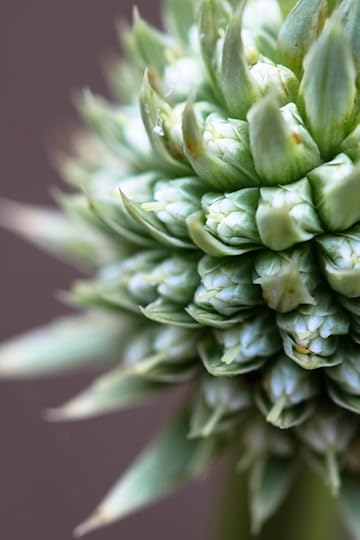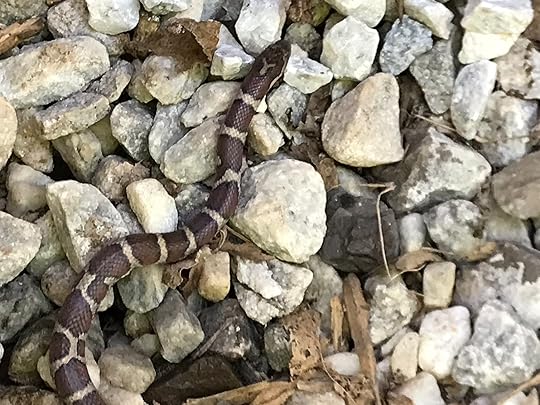Chuck Wendig's Blog, page 89
July 19, 2017
Yes, I Am Now On Instagram
Being the hip, trendy tastemaker that I am, I have now joined the brand new social media network for Cool, Rad World Wide Web Users — it’s this thing called Instagram.
Have you heard of it?
WELL, I’M OVER THERE NOW, PAVING THE WAY.
Yeah, no, I know, I’m way behind.
There existed a technological shift in the last five years inside my brain where at one point I cared to stay on top of this stuff and then I suddenly cared less about staying on top of this stuff. I still don’t know what the fuck Snapchat is or does or if it’s just a rotating carousel of dick pics that erase themselves. I haven’t joined all your fancy Circlespaces and Tickleclicks and Humprs and Fudholes and Beerfaces and other social media networks that allow you to automatically share your blood pressure numbers or the contents of your medicine cabinets or various arty photos of your nipples. I’m sure I’ll catch up in the next 20, 30 years.
But I now have joined Instagram.
I am to understand pictures over there are called “IGGS,” as in, “EGGS,” but Instagram photos. IG photos. IGGS. I’m sure this is true and if it’s not true it will be true now, as I have said it, and clearly I am a paragon, a voyager, a true tastemaker and universal lingo designer.
Or don’t, I dunno, I posted one picture, relax.
July 18, 2017
Repeal Without Replace: Out The Plane Without A Parachute
Healthcare and healthcare coverage is an important topic for me for two reasons.
1.) Because my father died without coverage. He went without coverage because he had a pre-existing condition, and he was in the gap between his actual retirement and the proper retirement age, so he went without coverage for a short time until he could pick up Medicare at 65. In that time he got prostate cancer, as he went without any kind of preventative checks. It metastasized. It killed him. And that was that.
2.) Because the ACA has been a boon for me as a writer — which is to say, as a small business, because that’s what I am. I went to get health insurance initially and it was very expensive to cover my family, and it did not cover a great deal… and that was before we even got into any tussle over pre-existing conditions. The institution of the ACA was fortuitous, and allowed us to instead go to the marketplace, where we got health insurance that was considerably cheaper and covered considerably more. It allowed me to embark upon the “novelist” phase of my career in a real way. Like my books? They exist, in part, because of the ACA.
So, with those two previously-mentioned caveats mentioned once more —
Hey, how’s the healthcare debate going in this country?
Good? Yeah?
*checks watch*
*stares off at a pile of medical waste on fire*
*someone adds a pile of diapers to the conflagration*
Oh, so that good, huh?
*clears throat*
So, last night, in case you missed it, the healthcare repeal and replace failed in the Senate because it did not accrue enough support — those who bailed on it (Senators Moran and Lee) suggested they wanted an open legislative process, and some even suggested a bipartisan look at healthcare going forward (gasp, what, you mean you’d like to, to, to cooperate whoa holy shit what a revolution). And then ol’ Turtle Waddle, ol Mr. Turkey Dildo, ol’ Senator Mitch McConnell, he said, OH HELL NO, and he released a statement that said they will now pursue a repeal of the ACA without a current replacement.
In case you are unsure what that looks like, imagine that it looks like a person holding a sewing machine swaddled in fabric, and then that person leaps excitedly out of a plane in the hopes of stitching together a proper parachute before turning into a pancake of blood-and-bone.
Then, this morning, our melting shit-scented candle of a president endorsed an even uglier version of this idea, saying, and I quote, “As I have always said, let Obamacare fail and then come together and do a great healthcare plan. Stay tuned!”
Stay tuned.
Like this is a reality show and not:
a) a massive industry on which our economy hangs
b) people’s lives.
This is our, ahem, “leader” —
Someone who is content to let a thing fail instead of leading the way. Instead of fixing or repairing. Can you imagine seeing a bridge that’s failing and saying, “I’ll let it fail, then replace it.” Worse, it’s like he’s ready to commit some grand guignol of insurance fraud — “As I have always said, let the house burn down, or maybe I’ll burn it down myself, then I’ll collect the insurance and we can come together and pay for a great big new house. Stay tuned!”
He will let the system fail.
He will let people die.
And then he’ll swoop in and we’ll do “great” healthcare.
What a pal, what a chum.
Anyway, back to the Senate.
The Senate passed a repeal-without-replace in 2015, and that succeeded — in part, I suspect, because it was purely performative. They knew Obama wasn’t going to sign it, because c’mon. Obama wasn’t going to undo part of his legacy. But they showed solidarity. They passed it, he vetoed it. It gets more complicated now because what McConnell is proposing is that they excise the ACA over two years, giving them a window of replacement.
But I want you to pay attention —
They last tried to repeal in 2015.
It is now 2017.
That was two years ago.
They still have no replacement.
That wasn’t the beginning, though — they’ve been trying to undo the ACA for SEVEN years.
And still, no replacement.
They now control the executive and the legislative branches of government.
And still, no viable replacement.
So, to assume that in two years they will come up with a capable healthcare system in place is not only absurd, it is statistically unlikely. (Never mind the fact that the CBO score on “repeal-without-replace” is the most devastating of all in terms of costs and people thrown off healthcare.) The GOP have nothing. They don’t have the chops. They’ve had seven years, then two, then they gained control of everything, and we’re still with the ACA.
Which, by the way, is a good thing.
Yes, the ACA is imperfect, but guess what? It’s fixable. (It in part was hamstrung by Rubio, who eliminated high-risk corridors.) Listen, as a parent with a kid, I gotta tell you — it’s an epic fucking blessing when you learn a thing is broken-but-fixable. It saves you money to fix the things that you can fix rather than replacing them. (That, one could argue, is a truly conservative mindset. Conserve what you have, fix what can be fixed.) Furthermore, it is galling to know we have leaders who are willing to play chicken with people’s actual lives and an entire industry in order to pursue a dogged crusade against what is, very honestly, a Republican-based plan (yes, the ACA was originally a Republican plan) that happened to be implemented by a black Democrat.
So, as always, I urge you:
Call your senators.
Thanks.
July 17, 2017
Macro Monday Was Really Inside Us, All Along
It’s body hair.
No, calm down, not that kind of body hair. Nothing south of the border.
IT’S NIPPLE HAIR ha ha no, not really, just arm hair.
No big news to share — well, I have a couple pieces, but I can’t actually share them lest I be murdered — so I’ll just say that, had a stellar event with Kevin Hearne and Fran Wilde the other day at the Free Library of Philly (and ahem apologies it’s why there was no flash fiction challenge, I had to bust out of here too early and forgot to hit POST). Huge crowd (as Kevin is wont to draw), and had a blast the whole way.
Prior to that I did one of those things that counts as PROPER ADULTING — not like, “I cleaned my counter, yay #adulting,” but rather, “I updated my last will and testament and figured out my physical and literary estate for when I finally kick off, be it today or ten thousand todays from now, and sure, hey, let’s consider the legal ramifications of my eventual hop-skip-shuffle off this mortal coil, whee #adulting.” This is a reminder that if you have not squared away the Circumstances After Your Demise, do so. Doubly so if you have children, triply so if you are a person who has intellectual property about which to worry.
Speaking of the mortal coil —
I am sad to see George Romero go. Romero created for us an entirely new mythology, and that’s no small thing. He understood that monsters were not merely monsters, but rather, that they were a commentary on us, or a reflection of us. Further, he was a paragon to both the horror community and the independent film community. Last week I had the distinct pleasure of being in a Night of the Living Dead anthology that Romero co-edited with Jonathan Maberry, and now, Romero being gone is just a kick to the teeth.
Onward, now, to a few more macro photos for the week — the first of which is from a plant that is literally called RATTLESNAKE MASTER (also my nickname in high school). Second photo is a ladybug pupa. Third photo is waterdrop on evergreen.
July 11, 2017
So, You’re Having A Bad Writing Day
You’re having a shitty writing day.
It happens.
I get a crap writing day at least once a week. Maybe twice. Once in a while, I get a whole bad run of writing days, like I’ve got some kind of creative food poisoning and every day is just the urgent regurgitation of narrative fluids without aim or purpose. It’ll be five heinous days in the word mines, where I’m sweating and raging and kicking dirt.
To repeat: it happens.
Problem is, these days, these fucking days, boy howdy — they can derail your train, can’t they? Knock you right off the track.
But it’s okay.
I’m here to help you get through them.
But first you have to get in the van.
*waits*
*waits some more*
Okay, you know what, looking at the van now, I maybe see what I did wrong. Maybe we don’t get in the van. Maybe we just stand outside the van. It’s cool. We can talk here, where you can easily run screaming for help.
The first thing you need to know is that:
Bad writing days — or, if you’re an artist, bad art-making days — are normal.
They are part of it. They are woven into the fabric of what we do.
In fact, writing is supposed to be hard. Easy things are boring things. Easy is like, putting on lip balm, or making a pot of $0.19 grocery store ramen. Those are not bad things, but they are not particularly consequential things, either. Nobody changed the world by putting on lip balm. (Cue 52 comments where people tell me that Winston Churchill and Roosevelt bonded over lip balm.) Writing a story or making art is not putting on lip balm. It’s not raking leaves, even if the mechanics feel that way sometimes.
Stories are bigger, stranger, sprawlier things.
Consider: the act of telling a story is you CONJURING AN ENTIRE UNIVERSE INSIDE YOUR MIND and then using words as knives to CARVE THAT UNIVERSE INTO REALITY SO THAT OTHERS CAN VISIT YOUR IMAGINATION. “Today I am going to make a world out of my brain that you can go to in your spare time,” you say aloud, hopefully realizing that this is far more significant and far more bizarre than tying your shoes or blowing your nose. Creating whole worlds is pyroclastic. It is volcanic. It’s heat and fire, it’s molten rock, it’s lightning inside black smoke amid the nose and clamor of thundering earth and boiling air. It is an astonishing, generative act.
And it’s sometimes hard.
Sometimes what we do is stage magic. Sometimes the magic is sacrificial.
Stage magic requires hours of practice where you get it wrong.
Sacrificial magic requires blood on the altar.
In both cases, the magic — be it trick or spell — is hard as hell.
As it should be. As it must be.
We sometimes get the false sense as creatives that, if this thing we do does not come naturally, then it is not worth doing — or worse, that we are somehow not meant to do it at all. I watch this with my son sometimes, where he wants to try something new and because he is not immediately successful he rules himself “terrible” at it and wants to stop. Thing is, he is terrible at it. Of course he’s terrible at it. What, he’s going to sit down on his first try at painting and summon a Mondrian Mona Lisa? No. He’s going to paint something that looks like a clown ate a unicorn and then threw it all up again. (Spoiler warning: sometimes I go to write a first draft and yeah, no, it looks like a clown ate a unicorn and then threw it all up again. This is how it goes. It’s part of the process, man.) This isn’t automatic. It’s not automagic. It takes time and effort and grit and sweat and confusion and probably hallucinogenic drugs and definitely an ingrained sense of free-wheeling foolishness.
It being hard is not a sign of it being not worth doing.
The difficulty is the point. The difficulty proves its worth.
The difficulty is not a sign that you don’t belong here.
Impostor Syndrome is real. Flip the script on it. Don’t let it have power over you. Admit you’re an impostor. Then admit that we’re all impostors — none of us belong here because art and story are forbidden, interstitial places. This thing we do is Buccaneer’s Den, it’s Mos Eisley, it’s a secret moon colony. Not a one of us “belongs” here. We all booked illegal passage through blackest night and sharky waters to get here. We’re not one ship, we’re countless life-boats strung together — a glorious flotilla of freaks.
This is who we are. It’s what we do. And what we do is sometimes hard. It’s hard for me. It’s hard for you. It’s hard for Stephen King. It’s hard for J.K. Rowling. King probably thinks that Rowling does it effortlessly, and Rowling probably thinks King sails through every draft, and the truth is, it’s hard for them, for you, for me, for every penmonkey that ever done monkeyed with a pen.
When a story reads effortlessly, it was not written effortlessly. In fact, the more effortlessly it reads, the more effort probably went into making it read effortlessly.
It took work.
Lots and lots of unholy, occasionally unhappy, hard-ass work.
Because, repeat after me: IT’S HARD.
Now, to clarify: it’s not hard in the way other work is hard. It’s not back-breaking work. Nobody’s shooting at us. We’re not training chimpanzees or wrangling eight-year-olds or wrestling bears. It’s easy, in that way. But it’s also hard in its own way, and let it be that way. If we diminish what we do, if we make it seem that the act of MAKING COOL STUFF is somehow cheap and glib and fucking throwaway, it undercuts our power. It sells short the necessary nature of art and story in the world. It makes what you do feel lesser when what you do is epic. Story moves the world. Art changes people. Entertainment gives us respite. Narrative gives us enlightenment.
It all moves the needle.
When you’re having a bad writing day, a hard writing day, remember that.
And remember too that when you sit down a week from now, or a month, or a year, the days the writing was hard and the days the writing was easy will be indistinguishable from one another. In fact, sometimes the easy days produce worse work than the difficult days. You never know. So don’t let it stop you. Put the bucket over your head and run at the wall anyway. And remember that all of this is just a draft, that it can all be fixed and changed, that what doesn’t work can be made to work. It can always be made to work with enough practice, with enough blood.
You’re having a hard day of writing, write anyway.
Do it because it’s hard.
Forgive yourself because it’s hard.
Don’t let one bad day be the gravestone for the rest of the days.
Then stop. Push a little, but don’t push so hard you drop your brain out of your ass. Go and take a walk, play with the dog, eat a churro, crank one out. Then get back to it tomorrow. Maybe it’ll be hard tomorrow. Maybe it’ll be harder tomorrow. I don’t know. Nobody knows. But the difficulty is the point. You’re ripping things out of you and putting them onto the page. Nobody said it was going to be easy. Nobody said it should be easy.
Let it be what it must be.
July 10, 2017
Macro Monday Has A Book Cover To Show You, Deer Reader
Look.
Looooook.
GAZE UPON THE ANTLERS AND DESPAIR.
Okay, no, wait, shit, don’t despair.
That’s just the cover of my brand spanking new writing book, even though it’s not really a writing book but rather, a book about storytelling, about how we tell stories, why we tell them, and how we can use all the fiddly bits of narrative to make them more impactful.
It also contains a deer on the cover.
And various personal anecdotes like the one about the masturbating elk.
The book is out October 18th of this year.
And why yes, my deer, you can pre-order it:
Indiebound | Amazon | B&N
And yes, I do believe I’ll be doing a brief li’l book tour in support — I will in fact be joining word maestro Kevin Hearne on his book tour for the really-fucking-awesome Plague of Giants and story-maven Fran Wilde (of the Bone Universe series) in San Francisco (Borderlands, Oct 17th), Portland (Powells in Beaverton, Oct 18th) and Seattle (University Bookstore, October 19th).
Though you may be saying hey that’s too far away, I wanna see you guys sooner, then DEER READER, I’ll note that you can come see us this motherfucking Friday (the 14th) if you’re anywhere near Philadelphia (event details here).
So, do all of that.
Go buy all the books.
Come see all the authors.
Flail and gibber and wail.
Also yeah no, I know that’s not a macro photo, but pretend it’s a really tiny deer.
(Sidenote: I’ve been having some problems with the blog again — I think they’re solved now, was based on a wonky .htaccess file. Apologies for any downtime or unapproved comments!)
July 7, 2017
Flash Fiction Challenge: There Is No Exit
Last night, I had a dream — no, no, not the one with Mrs. Butterscotch and the strap-on dildo covered in spray cheese. This one was a dream in which a phrase figured prominently:
There is no exit.
I don’t know why.
I don’t know what it means.
It probably doesn’t mean anything, because dreams are just your brain’s way of pooping.
Anyway.
I thought it would make a very good flash fiction challenge.
So, incorporate that phrase —
“There is no exit”
— into the story. Either as a title, a line of dialogue, a theme, whatever.
Go forth and tell the story.
Length: ~1000 words
Due by: July 14th, Friday, noon, EST
Post at your online space, then give us a link so we can read it.
June 30, 2017
Flash Fiction Challenge: Here Are Your Five-Word Titles
Last week, I said, gimme some five-word-titles.
This week, I picked ten at random.
They are:
Dark Lords of Shining Sun
Paper Cuts Make Good Bait
You Don’t Steal My Shit
Once There Was Far Music
I Shouldn’t Have Swiped Right
Ghosts of the Sea Queen
Someone’s Dragon Is Double-Parked Outside
The House No One Built
Dear Robbie Benson, Save Me
Time For Tea And Treachery
Your job:
Pick one or nab one at random.
Then write a story using it.
Length: ~1500 words
Due by: Friday, July 7th, noon EST
Post at your online space. Link back here.
Pick and write.
June 28, 2017
Emmie Mears: You Have Comrades In This Trench
Emmie Mears is the badass author of the Ayala Storme series. Please behold their guest post, which they wrote to let you know — you are not alone.
* * *
You need to get out of bed.
Roll for initiative.
For some reason, you’re stuck in the perma-one.
But let’s look at this from a different angle.
***
You’re probably not like Ayala Storme. You likely don’t have bright orange hair or violet eyes that clash with it. If you do have those eyes, it’s probably not because you were born a Mediator—you’re just a super rare earthling.
You’re probably a norm. A Muggle, as it were. Stuck on this rock with all seven billion of the rest of us.
But you might have something in common with Ayala anyway.
***
You don’t know exactly how it picks you. Sure, maybe it’s in your genes. Science is pretty certain of that. But why you? Why your consciousness, your soul, your essential Platonic you-ness?
Just like Ayala’s eyes, you get it when you’re born. It might not wake up for a long time. You might go years or even decades before you see your first demon.
***
When Ayala is seconds old, the doctor scoops the mucous from her mouth and waits for her to yell. Clips the cord.
At that point it’s already done.
She gets taken away from her mother and brought to a place where everyone will come face to face with demons. As soon as she can lift a stick, they teach her how to fight with a sword.
Is that how it felt for you?
That’s how it felt for me. I learned early that there were demons out there. They invaded my home, sunk their claws in my family. They lurked in my room, stalked my sister and me both until we felt we’d never be rid of their slime. They don’t make a detergent strong enough for that.
Maybe for you it was different. Maybe you were older when you saw your first one. It could have been any number of things or none. When they linger long enough in your periphery, you start fighting just to exist, even if they don’t go directly for your throat.
***
Ayala kills her first demon when her age is still in the single digits. It’s a little, stubby thing. It makes her feel strong and scared and serious…for a while.
You understand that, don’t you?
The first one you kill feels like a triumph until the second one rears its head.
The second one is always bigger, always quicker. Any arrogance you let soak into your skin scrubs away when it appears.
You’ll probably beat that one, too. And the next one, and the next one.
You’ll learn that there are lots of different kinds. Some spit at you with corrosive venom. Others shoot you full of quills. Some just have claws and teeth, and those are bad enough. Some jump up and land on your back, heavy, pendulous.
You start to notice that some kinds scare you more than the others.
Ayala understands that. She learns early on that behind every demon is another one, waiting.
***
How do you fight when that is the truth? How does she keep picking up her sword, first as a terrified kid, later as a gawky adolescent, finally as a resigned adult?
How do you?
Ayala knows in every molecule of her being that her world is ever only inches away from sliding right into hell. Not even sliding. Becoming hell.
Even though she knows there are thousands of people just like her out there, picking up their swords day after day to stab the same slime over and over—even though she knows that, she believes she’s in this alone.
It’s easy to think that. So easy to feel it, and when you feel it, it feels true.
It feels true because we see people we love lose their lives to the demons. Sometimes people we see every day. Sometimes people we know through their art.
It feels true because of the endless scroll of social media. How could we feel anything but small in the face of a fragile world so often led by fear?
Ayala see that too.
But believing that we fight alone doesn’t make it true.
***
Ayala’s not the only person who sees demons and fights them. In her world, plenty of people don’t see what she sees.
The same happens here.
Telling Ayala to just buck up and look at the good in her life? She’ll laugh in your face. Telling her not to worry? She knows damn well the danger is real.
You know that too. It’s just harder when the demons you fight only show their faces to a relative few.
There’s no secret to surviving this fight. It gets harder every time we lose another one of the good folks. When you’re knee deep in the shit, it makes you sink a little bit more.
The best weapon we have, though, is one another.
I know, I know. Ayala’d say that’s cheesy too.
Here’s the thing: Ayala’s world needs her. Just like this one needs you.
Those demons you’re fighting? You’re not fighting them alone. They only come out in the dark, and they do it so we can’t see the soldiers around us. It’s their single best tactic, isolating you from your comrades.
Fuck that.
Fuck that right to all six and a half hells.
I’ve fallen on some black days these past few years, deeper still the past few months. One look at my social media feeds tells me I’m far from being the only one, but still so many times, I don’t know how to reach out a hand.
So I’m asking you: do you know that we’re here?
For anyone fighting demons, that’s one of the biggest lessons to learn. It’s not a one time deal, either. We learn it once, we forget, we learn it again. Sometimes with some bruises to show for it.
You don’t get to choose your genes, your brain chemistry, which traumas hit you and when. You don’t get to choose those things. Ayala doesn’t get that choice either.
If we can’t see the others fighting their own battles around us, what we can choose is to raise our voices. Let them hear us scream defiantly into the faces of our demons.
A couple weeks ago, I had a night where I wasn’t sure I’d see the morning.
I shared this on Instagram:
Depression is a motherfucker. I’m trying to be open about it because if you’re fighting the same monster I am, you deserve to know you have comrades in this. When you’re in the shit and depression blurs your vision and you’re up all night trying to hang on against the claws dug deep in your heart and mind, it’s hard to remember that mere inches away in this battle there are others. Depression isolates. It lies.
This is my face. I fought all night, and hands of friends held me up, and when dawn came, they cradled me.
You might think you have no one to do that for you. It’s not true. I may be fighting my own battle, but you can reach out your hand and we can fight together.
Ayala’s story is complete, but it’s not over. When I wrote these four books, I didn’t consciously realize I was writing a big metaphor for depression, several hundred thousand words long.
She’s never alone in her fight.
Neither are you.
***
Ayala Storme’s series is complete at four books, countless butts, a lot of really cute bunnies, and heaps of hellkin—she’s also queer. She’ll fight you if that’s a problem. In her world, they’ve got bigger frahlig demons to fry.
All four books are now available at your choice of snazzy retailer. If you want a chance to win this entire series in paperback (signed!), audio, or ebook, enter here. (terms and conditions on page).
* * *
Emmie Mears is also M Evan Matyas. You can call them Evan or Emmie—they’ll answer to either. Their pronouns are they/them. Evan is about to puddle hop over to Scotland with their partner and two cats. If you want to catch an exclusive Stormeworld short story, check out their Patreon [patreon.com/emmiemears]. There’s a whole world of exclusive content over there that you can get your paws on for a dollar a month. It helps Evan keep writing and fighting.
June 27, 2017
Ways To Stay Motivated In This Shit-Shellacked Era Of Epic Stupid
Everything is dumb right now.
From nose to tail, we have become the dumbest, saddest pig at the county fair. Historians will not refer to this period as THE DARK AGES, but rather, THE DUMB AGES. The greatest question I get, right now, is how to simply persist creating art and staying motivated and creative in this epoch of syphilitic dipshittery, so I thought I’d bop in here and try my hand at answering that.
1. Stop staring at the news and at social media. This is hard, because presently the news is a series of constantly crashing cars right outside your window. One after the next, bang, smash, crash. The symphony of shrieking metal is very, very hard to turn away from. In many eras, the news is only marginally relevant to you on a day to day basis but, to me it seems that ratio is going up, up, up. The healthcare debacle alone affects me, um, rather significantly. If I don’t have access to healthcare via health insurance, then this thing that I do gets a whole lot harder. Just the same, I gotta know to turn away from it. The news is a vampire. It’ll bleed you dry and leave you a desiccated husk on the carpet. You can look at it, but pick your times. Write or make art first, then go and stare into the unswerving gaze of Sauron himself.
2. Writing is an act of resistance. Art is an act of resistance. Shit, just living your life in the maelstrom is resistance. Here’s how you know when something is a act of resistance: would the Shitty People, the Petty Men with Axes, want you to do it? No? Then do it. They want you showing your belly. They want you to stop contributing your ideas. They want you to shut the fuck up. So, don’t. Don’t get sad. Get mad. Get fucking pissed. And then —
3. Put that piss and vinegar into the work. Pour it right in. Glug, glug, splish-splash.
4. Do some real resistance, too. Make your calls. Join a protest. Contribute some cash to an organization who will carry the fight in ways you cannot. Key point: do this after you’re done doing the thing you need to do. You know how the airlines tell you to put on your own mask first? Put on your own mask first. Make the words. Art the art. Eat that cheese. Pluck that banjo. Then when you are done for the day, get down to the acts of resistance major and minor.
5. Hey, also, just take care of yourself. These are dumb times and dumb times often call for tireless marathons of beer and donuts and naps — and definitely do those things from time to time! — but also, like, eat some fucking vegetables, get some exercise, get some rest. Trust me, I get it, pretty much every day I hit a period where I’m like, “The best thing I can do right now would be to drink whiskey until I stop recognizing the world,” but I don’t, because I have to stay sharp. I have to stay sharp to make stuff and to be ready for whatever this era of epic stupid is going to throw at me. Take care of your shit.
6. Don’t dismiss what you do. If you’re making the words dance or you’re snapping photos or drawing pictures, and you worry that what you’re doing is somehow shallow or insignificant, fuck that right in the banana-pipe. Even at the barebones level, entertainment has value. In times far worse than these, people needed to be entertained — not in a bread and circuses way, but in a way where, if you wanna regain some sanity and light in the middle of deep fuckery, then you need something fun. If you’re writing to entertain, I salute you. No shame in that. You’re awesome. Keep doing it.
7. But also don’t be afraid to go bigger. If your mode is to use the work to carry a greater message or elevate your ideas or to even just contextualize the bees and murder that are currently living in your heart, hey, do that. Do whatever you gotta. Just make stuff. It feels good. And we need you to do it.
8. Art has meaning. Obama talked about the books that made him who he was. Most world leaders are readers. There are reasons that a book like Atwood’s The Handmaid’s Tale is so popular right now — art leaves its mark, indelible and essential, and it helps us both understand what has come before, what will come again, and what’s happening right now. It gives context and inspiration. It challenges and us and can unfuck our heads — even as it sometimes fucks with our heads in equal measure.
9. Talk to others like you. Sometimes you just have to be with your people. Either to commiserate about current global shenanigans or, better yet, just to talk shop. Talking shop energizes me. The news enervates me. Find your people. And together, you find your way.
10. Remain cautiously, grimly optimistic. Optimism is hard. So fucking hard. Optimism is in itself an act of resistance. But optimism, as long as it’s not blind and naive, has value — and can inspires others to be the same. I’m not saying to simply assume that everything will be magically fine. But optimism paired with a bit of realism and a lot of effort can actually do a world of good. The world has gone wonky in the last year, but we still live in a far better time than most other times throughout history. We still have dogs and otters. We still have shitloads of ice cream. We still have options and a way out of the storm. We have art, too — ours, and others. Train your brain to look for good stuff. And even better, train your brain to look for ways to make things better — in small ways, in big ways. And then, most importantly, train your brain to make art. Think about words. Think in images. Distract yourself with your work. Be hopeful, if not about the world, then about what you can contribute to it. Make cool shit. The end.
How do you stay motivated in this cauldron of shit-soup we call a world?
(Also, thanks to everyone who came by and commented yesterday. Rest assured, the blog ain’t going anywhere, and shall remain at normal operations, probably until I die of beer and donuts.)
* * *
Also, hey, here, have this: I’ll put my Mega-Ultra-Book-Bundle on sale, 50% off with coupon code MAKECOOLSTUFF. It’s got eight writing books and two novels, so ten books for ten bucks. Go grabby grabby if you so choose.
June 26, 2017
Macro Monday Changes Its Skin (Bonus Blog Question For Y’all)
 That there is some snake skin.
That there is some snake skin.
I remember seeing my first snake when I was a kid — I was maybe six, wandering through the woods and fields behind my house, and my father was nearby but out of sight. I stumbled upon a rotten, hollowed-out stump, and sitting in the middle of that stump was a garter snake. I lost my shit. I fucking screamed like I had just seen someone get murdered. But I couldn’t move. I was paralyzed with fear. That, or TRANSFIXED BY OPHIDIAN HYPNOSIS. Either/or.
Regardless, by father came running, certain that I was about to be eaten by a Yeti or something, but turns out, nope, just a li’l ol’ garter snake. He picked it up and showed it to me and it was of course harmless, and I wasn’t scared of snakes anymore. My kid has none of that fear that I possessed — because the other day, when I lifted up a stone, I found this fancy fellow:
It’s a milk snake.
(insert “my milksnake scares all the boys from the yard” joke here)
Folks around here tend to confuse them for copperheads, but we don’t get many (or even any) copperheads in this part of Pennsyltucky. We do get snakes people think are copperheads, like milk snakes and water snakes, and then they flip out and behead them with shovels or dispatch them with rifles because people are unnaturally scared of snakes, even though snakes are amazing and do a lot of good pest control work that would cost you a lot of money if you asked a human being to do it. (Sneks don’t care about your capitalism, yo.)
Anyway, this little snakey-fella or snakey-lady was underneath the stone, and B-Dub was like, oooooh, and he wanted to get close and look at it. So we did, within reason, without spooking the thing too terribly much. I got off a pic and then gently replaced the rock.
Days later, we found its skin.
(Another snap:)
And B-Dub kept the skin in a jar that also contains about two dozen cicada skins and some dragonfly and butterfly wings, and if he were an adult it would look like the kind of thing a serial killer keeps, but it’s a pretty cool jar. You can rattle his creepy cicada jar and it makes a sound:
THE WHISPER-RASP OF DEAD FLESH.
WHAT PRECIOUS NECROMUSIC.
Point of the story is, what? I dunno. Don’t be scared of snakes, I guess, because SNEKS BE COOL.
Also, though, there is a transformative element to a snake shedding its skin, and that leads me into the next question, where I ask you about THIS VERY BLOG.
The blog numbers here are waaaaay down.
This is not an exaggeration when I say November of last year (cough cough election time) came and went, and after it, my views went over a cliff. My purely anecdotal feeling on this is that it has less to do with what I’m posting and more to do with what’s going on in the world. People, to my delight, seem to be reading more actual articles and fewer ding-dong bloggers (cough cough like me), and given that humans only have so much reading time in them in a given day, one suspects that some more casual reading (cough cough terribleminds) may have fallen sacrifice to that. Plus, sometimes I’ll post something I think is cool, and ten minutes later, it’s all BREAKING NEWS: EL PRESIDENTE SEEN HIDING IN VLADIMIR PUTIN’S UNDERWEAR DRAWER or BREAKING NEWS: REPUBLICANS GATHER TOGETHER IN SECRET SORCEROUS CEREMONY TO SACRIFICE THE LAST UNICORN IN ORDER TO DISMANTLE THE FINAL SACRED PROTECTIVE LOCKS OF OBAMACARE, THUS DOOMING THEIR CONSTITUENTS TO WORSE AND MORE EXPENSIVE HEALTH CARE. Or just BREAKING NEWS: SHIT’S ON FIRE AGAIN. Eyeballs naturally flit toward the news, which these days is effectively a stock ticker that doesn’t track stock prices, but rather the highs and lows of our collective social anxieties.
So, it leaves me feeling like — well, what the hell do I do?
Seems I have a handful of options, and I’m happy to hear your thoughts on these, so feel free to swing your way down into the comments and add your two pennies:
a) Fuck it, blog less, turn this into a mostly promotional vehicle.
b) Fuck it, blog the same as I do now, because ultimately I don’t blog for eyeballs but because I cannot contain the stupid thoughts that exist inside my head so I might as well purge them here — even though I kinda pay a bit of a premium to host this sucker.
c) Turn it to a Patreon-kinda-gig.
d) Change the blog material — less writery stuff, more othery stuff (recipes, rants, whatever).
e) SHUT IT ALL DOWN
f) I dunno, cat pictures or something, even though I don’t have a cat.
Admittedly, some of my reduced blog numbers are because subscriptions are strong — over 6k subscribing means those people don’t need to “hit” the blog everyday to see what’s here. And guest posts seem to be holding their numbers, which is nice. Still, I get the overall feeling that engagement here is lower, and that coincidentally happened right around November.
If you have thoughts, pop ’em below.
OKAY BYE














